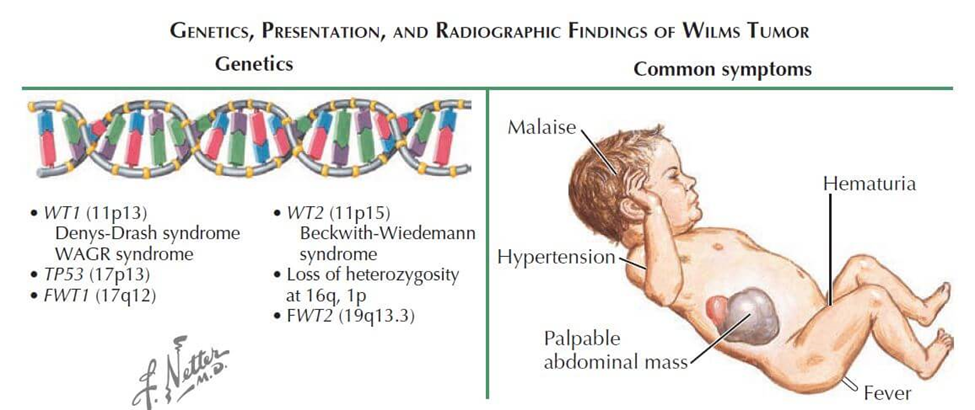A child is diagnosed with Wilms' tumor. During assessment, the nurse in charge expects to detect:
Gross hematuria
Dysuria
An abdominal mass
Nausea and Vomiting
The Correct Answer is C
A. Gross hematuria: Gross hematuria refers to visible blood in the urine, which can present as pink, red, or cola-colored urine. While hematuria can be associated with various kidney conditions, including Wilms' tumor, it is not a consistent or defining symptom of this specific tumor. Additionally, because the tumor is typically confined within the kidney and does not usually invade the urinary tract, gross hematuria might not always be present.
B. Dysuria: Dysuria is the medical term for painful or difficult urination. It is not a typical symptom of Wilms' tumor, as this tumor primarily affects the kidney and may not directly affect the urinary tract in a way that causes painful urination.
C. An abdominal mass: This is the correct answer. Wilms' tumor often presents as a palpable abdominal mass, which may be felt during physical examination. The mass is usually firm, non-tender, and confined to one side of the abdomen. Detection of an abdominal mass should prompt further diagnostic evaluation to confirm the diagnosis and plan appropriate treatment.
D. Nausea and vomiting: While some children with Wilms' tumor may experience nausea and vomiting, these symptoms are nonspecific and can be caused by various conditions. They are not considered characteristic or defining features of Wilms' tumor. The presence of nausea and vomiting would prompt further assessment to determine the underlying cause

Nursing Test Bank
Naxlex Comprehensive Predictor Exams
Related Questions
Correct Answer is A
Explanation
To predict the expected weight of the 12-month-old boy, we can use the general guideline that a child's weight should triple from birth to 12 months.
Given that the boy weighed 8 lb 2 oz at birth, we can calculate the expected weight at 12 months by tripling this weight.
8 lb 2 oz = 8.125 lb
Tripling this weight:
8.125 lb * 3 = 24.375 lb
Now, we convert this weight back to pounds and ounces:
0.375 lb * 16 = 6 oz
So, the expected weight of the 12-month-old boy should be approximately 24 lb 6 oz.
Correct Answer is A
Explanation
A. Place the child in a side-lying position.
This is the correct action to take during a seizure to prevent aspiration and maintain an open airway. Placing the child in a side-lying position helps to prevent choking or aspiration if vomiting occurs and allows saliva or other fluids to drain out of the mouth instead of being inhaled into the lungs.
B. Restrain the child's arms.
Restraining the child's arms is not recommended during a seizure. It can potentially cause injury to the child or the person trying to restrain them. It may also exacerbate muscle spasms and increase the risk of injury during the seizure.
C. Elevate the child's legs on a pillow.
Elevating the child's legs on a pillow is not necessary during a seizure and is not a recommended intervention. It does not address the immediate needs of the child during a seizure, such as maintaining an open airway and preventing injury.
D. Insert a padded tongue blade into the child's mouth.
Inserting anything into the child's mouth during a seizure, including a tongue blade, is strongly discouraged. It can cause injury to the child's teeth, gums, or oral tissues and increase the risk of choking or aspiration. It may also result in the nurse getting bitten during the seizure. Maintaining a clear airway and ensuring the child's safety are the priorities during a seizure, and inserting objects into the mouth can interfere with these goals.
Whether you are a student looking to ace your exams or a practicing nurse seeking to enhance your expertise , our nursing education contents will empower you with the confidence and competence to make a difference in the lives of patients and become a respected leader in the healthcare field.
Visit Naxlex, invest in your future and unlock endless possibilities with our unparalleled nursing education contents today
Report Wrong Answer on the Current Question
Do you disagree with the answer? If yes, what is your expected answer? Explain.
Kindly be descriptive with the issue you are facing.
